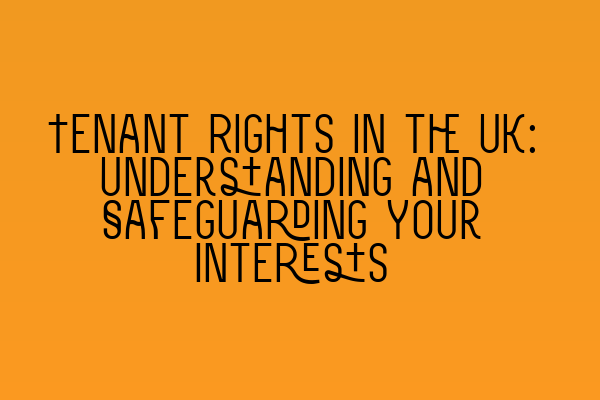Tenant Rights in the UK: Understanding and Safeguarding Your Interests
As a tenant in the UK, it is crucial to have a solid understanding of your rights in order to protect your interests and ensure a positive and fair housing experience. In this blog post, we will explore the key tenant rights in the UK, providing you with the knowledge and insights to navigate the rental market confidently.
1. Right to a Written Contract
When entering into a tenancy agreement, it is essential to have a written contract. This contract outlines the terms and conditions of the tenancy, including the rent, duration, and responsibilities of both the landlord and tenant. Make sure to thoroughly review the contract before signing and seek legal advice if needed. Remember that verbal agreements may not offer the same level of protection as written contracts.
2. Right to a Safe and Habitable Property
As a tenant, you have the right to live in a safe and habitable property. This means that your landlord is responsible for maintaining the property, ensuring it meets all necessary health and safety standards. If you encounter any hazards or issues, such as faulty wiring, leaks, or pests, it is your right to request repairs from your landlord.
3. Right to Privacy
Your home is your private space, and as a tenant, you have the right to enjoy privacy within your rented property. Landlords should provide reasonable notice before entering the property for inspections or repairs, and they should never invade your privacy without a legitimate reason. If you feel like your privacy is being violated, consult your tenancy agreement and seek legal advice.
4. Right to Protection from Unfair Eviction
Tenants in the UK are protected from unfair eviction. Your landlord cannot simply evict you without proper notice and following the legal eviction process. There are specific procedures and notice periods that must be followed depending on the type of tenancy agreement. If you receive an eviction notice, seek legal advice to ensure your rights are protected.
5. Right to a Rent Deposit Protection Scheme
When renting a property in the UK, your landlord is required by law to protect your deposit in a government-approved deposit protection scheme. This ensures that your deposit is safe and can be returned to you at the end of your tenancy, minus any reasonable deductions. If your landlord fails to protect your deposit, they may face penalties and you may be entitled to compensation.
6. Right to Fair Rent Increases
While landlords have the right to increase rent, they must do so fairly and within the limits set out by the law. In most cases, the rent increase should be in line with market rates and they must provide you with proper notice, usually a minimum of one month. If you believe your rent increase is unfair, seek advice from a housing professional or a solicitor.
7. Right to Challenge Unfair Terms and Conditions
Some tenancy agreements may contain unfair terms and conditions that could be detrimental to your rights as a tenant. If you come across any unreasonable clauses, such as excessive fees or unfair restrictions, you have the right to challenge them. Seek legal advice if you believe your tenancy agreement contains unfair terms.
Understanding your rights as a tenant is crucial for maintaining a positive and fair housing arrangement. By being aware of your rights, you can better protect your interests and address any issues that may arise during your tenancy.
If you are preparing for the SQE exams in property law and land law, check out our related articles for valuable resources and preparation courses:
– SQE 1 Practice Exam Questions
– SQE 1 Practice Mocks FLK1 FLK2
– SQE 2 Preparation Courses
– SQE 1 Preparation Courses
– SRA SQE Exam Dates
At SQE Property Law & Land Law, we are here to support you in your legal journey, providing comprehensive resources and expert guidance. Stay informed, know your rights, and make the most of your tenancy experience.
